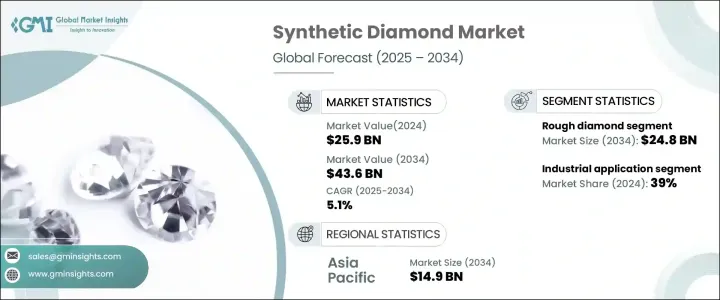
|
시장보고서
상품코드
1698578
합성 다이아몬드 시장 - 기회, 성장 촉진요인, 산업 동향 분석, 예측(2025-2034년)Synthetic Diamond Market Opportunity, Growth Drivers, Industry Trend Analysis, and Forecast 2025-2034 |
||||||
세계의 합성 다이아몬드 시장은 2024년 259억 달러로 평가되어, 2025년부터 2034년까지 5.1%의 연평균 복합 성장률(CAGR)로 성장할 것으로 예측되고 있습니다.
실험실 다이아몬드에 대한 수요 증가는 소비자와 기업을 매료시키고 업계를 재구성합니다. 천연 다이아몬드와 달리 합성 다이아몬드는 전자 제품, 산업용 공구, 치료기기 등 다양한 용도에 대응합니다. 지속 가능하고 비용 효율적인 대체품으로의 시프트가 보급의 원동력이 되고 있어, 제조업체는 선진적인 제조 기술을 활용해 품질과 성능을 향상시키고 있습니다.

합성 다이아몬드는 폴리시드 유형과 러프 유형으로 분류됩니다. 폴리시드 다이아몬드 부문은 2024년에 150억 달러로 평가되었으며, 2034년에는 248억 달러로 상승할 것으로 예상됩니다.
| 시장 규모 | |
|---|---|
| 시작 연도 | 2024년 |
| 예측 연도 | 2025-2034년 |
| 시작 금액 | 259억 달러 |
| 예측 금액 | 436억 달러 |
| CAGR | 5.1% |
폴리시드 다이아몬드는 주로 고급 보석, 고급 액세서리, 고급 시계에 사용됩니다. 다이아몬드 원석보다 30-40% 고가임에도 불구하고, 그 수요는 독점적이기 때문에 확대가 전망되고 있습니다.
합성 다이아몬드의 제조 공정에는 고압 고온(HPHT)과 화학 기상 성장법(CVD)이 있습니다. HPHT와 CVD는 산업용도, 특히 전자기기와 고출력 공구에서 중요한 역할을 하기 위해 확대를 계속하고 있습니다.
CVD 기술은 양자 컴퓨팅 및 열 관리 솔루션과 같은 차세대 용도의 요구를 충족시키기 위해 진화하고 있습니다.
용도별로는 합성 다이아몬드 시장은 보석용, 공업용, 일렉트로닉스용, 의료용, 기타 용도로 나눌 수 있습니다. 보석용 분야는 여전히 급성장하고 있으며, CAGR 5.6%를 기록해 2024년에는 시장 전체의 29%를 차지했습니다.
산업용 합성 다이아몬드 시장은 특히 절삭 공구나 연마제로 꾸준히 성장하고 있습니다. 전자 산업이나 의료 산업에서도, 열전도체나 정밀 기기로서 합성 다이아몬드의 채용이 증가하고 있습니다.
아시아태평양의 2024년 매출은 90억 달러로, 2034년에는 149억 달러에 이를 것으로 예측되고 있습니다. 중국은 연구개발에 대한 다액의 투자, 첨단 제조 능력, 산업용 등급의 다이아몬드 생산에 있어 압도적인 존재감으로 인해 주요 국가로 계속되고 있습니다.
목차
제1장 조사 방법과 조사 범위
- 시장 범위와 정의
- 기본 추정과 계산
- 예측 계산
- 데이터 소스
- 1차 조사와 검증
제2장 주요 요약
제3장 업계 인사이트
- 생태계 분석
- 밸류체인에 영향을 주는 요인
- 이익률 분석
- 혁신
- 미래의 전망
- 제조업체
- 유통업체
- 공급자의 상황
- 이익률 분석
- 주요 뉴스
- 규제 상황
- 영향요인
- 성장 촉진요인
- 반도체 업계 수요 증가
- 첨단 기술의 채용 증가
- 뛰어난 열적 및 전기적 특성
- 일렉트로닉스 산업의 확대
- 천연 다이아몬드를 웃도는 비용 경쟁력
- R&D 투자 증가
- 지속가능성과 윤리적 조달
- 산업용도에서의 사용확대
- 업계의 잠재적 위험 및 과제
- 높은 초기 생산 비용
- 대량 채용에 있어서의 기술적 한계
- 대체 소재와의 경쟁
- 성장 촉진요인
- 성장 가능성 분석
- Porter's Five Forces 분석
- PESTEL 분석
제4장 경쟁 구도
- 소개
- 기업 점유율 분석
- 경쟁 포지셔닝 매트릭스
- 전략 전망 매트릭스
제5장 시장 추계 및 예측 : 유형별, 2021-2034년
- 주요 동향
- 폴리시드
- 러프
제6장 시장 추계 및 예측 : 제법별, 2021-2034년
- 주요 동향
- 고압 고온(HPHT)
- 화학 기상 성장법(CVD)
제7장 시장 추계 및 예측 : 용도별, 2021-2034년
- 주요 동향
- 보석
- 공업
- 일렉트로닉스
- 의료
- 기타(광학, 항공우주 등 포함)
제8장 시장 추계 및 예측 : 지역별, 2021-2034년
- 주요 동향
- 북미
- 미국
- 캐나다
- 유럽
- 독일
- 영국
- 프랑스
- 스페인
- 이탈리아
- 러시아
- 아시아태평양
- 중국
- 인도
- 일본
- 호주
- 한국
- 라틴아메리카
- 브라질
- 멕시코
- 중동 및 아프리카
- 사우디아라비아
- 남아프리카
- 아랍에미리트(UAE)
제9장 기업 프로파일
- Adamas One
- Applied Diamond
- Blue Nile
- Clean Origin
- Diamond Foundry
- Element Six UK
- Henan Huanghe Whirlwind
- Iljin Diamond
- James Allen
- New Diamond Technology
- Pure Grown Diamonds(PGD)
- Rahi Impex
- Ritani
- Sumitomo Electric Industries
- Swarovski
- Vibranium Lab
The Global Synthetic Diamond Market was valued at USD 25.9 billion in 2024 and is projected to grow at a 5.1% CAGR from 2025 to 2034. The increasing demand for lab-grown diamonds is reshaping the industry, attracting consumers and businesses alike. Unlike natural diamonds, synthetic variants cater to diverse applications, including electronics, industrial tools, and medical equipment. The shift toward sustainable and cost-effective alternatives is driving adoption, with manufacturers leveraging advanced production technologies to improve quality and performance.

Synthetic diamonds are classified into polished and rough types. The polished diamond segment accounted for a significant share of market revenue in 2024, generating USD 25.9 billion, up from USD 20 billion in 2020. The rough diamond segment was valued at USD 15 billion in 2024 and is expected to rise to USD 24.8 billion by 2034. Rough diamonds comprised 58% of the total market, reflecting strong international demand.
| Market Scope | |
|---|---|
| Start Year | 2024 |
| Forecast Year | 2025-2034 |
| Start Value | $25.9 Billion |
| Forecast Value | $43.6 Billion |
| CAGR | 5.1% |
Polished diamonds are primarily used in fine jewelry, luxury accessories, and high-end watches. Their market expansion is supported by increasing disposable income, evolving consumer preferences, and a rising inclination toward personalized jewelry. Despite being 30-40% more expensive than rough diamonds, their demand is expected to grow due to exclusivity. Meanwhile, rough diamonds serve as the foundation of the diamond trade, supplying raw materials to polishers and jewelers.
The manufacturing process for synthetic diamonds includes High-Pressure, High-Temperature (HPHT) and Chemical Vapor Deposition (CVD). The latter is rapidly advancing, outpacing offline sales growth by 5.2%. HPHT and CVD methods continue to expand due to their critical role in industrial applications, particularly in electronics and high-powered tools. Innovations in pressure control technology are enhancing crystal quality, making HPHT diamonds more competitive in the jewelry and industrial markets.
CVD techniques are evolving to meet the demands of next-generation applications such as quantum computing and thermal management solutions. The production of defect-free diamonds is accelerating their adoption in the semiconductor and optical industries. As these sectors integrate synthetic diamonds into high-performance systems, market expansion is expected.
By application, the synthetic diamond market is divided into jewelry, industrial, electronics, medical, and other uses. The industrial segment led with a 39% share in 2024 and is projected to maintain growth through 2034. Jewelry remains the fastest-growing segment, registering a 5.6% CAGR and comprising 29% of the total market in 2024. Increasing consumer preference for cost-effective and sustainable alternatives is driving demand across North America and Asia Pacific.
The market for industrial-grade synthetic diamonds is growing steadily, particularly in cutting tools and abrasives. The electronics and medical industries are also witnessing increased adoption, utilizing synthetic diamonds as heat conductors and precision instruments. Emerging applications in optics and aerospace are further expanding market potential.
Asia Pacific generated USD 9 billion in revenue in 2024, with projections to reach USD 14.9 billion by 2034. The region's strong manufacturing base and industrial demand position it as a global leader. China remains a key player due to substantial investments in research and development, advanced manufacturing capacity, and a dominant presence in industrial-grade diamond production. Sales in China are expected to reach USD 6.3 billion in 2024, continuing the upward trajectory observed in previous years.
Table of Contents
Chapter 1 Methodology & Scope
- 1.1 Market scope & definition
- 1.2 Base estimates & calculations
- 1.3 Forecast calculation
- 1.4 Data sources
- 1.4.1 Primary
- 1.4.2 Secondary
- 1.4.2.1 Paid sources
- 1.4.2.2 Public sources
- 1.5 Primary research and validation
- 1.5.1 Primary sources
- 1.5.2 Data mining sources
Chapter 2 Executive Summary
- 2.1 Industry synopsis, 2021-2034
Chapter 3 Industry Insights
- 3.1 Industry ecosystem analysis
- 3.1.1 Factor affecting the value chain
- 3.1.2 Profit margin analysis
- 3.1.3 Disruptions
- 3.1.4 Future outlook
- 3.1.5 Manufacturers
- 3.1.6 Distributors
- 3.2 Supplier landscape
- 3.3 Profit margin analysis
- 3.4 Key news & initiatives
- 3.5 Regulatory landscape
- 3.6 Impact forces
- 3.6.1 Growth drivers
- 3.6.1.1 Growing Demand in the Semiconductor Industry
- 3.6.1.2 Rising Adoption in Advanced Technologies
- 3.6.1.3 Superior Thermal and Electrical Properties
- 3.6.1.4 Expansion in the Electronics Industry
- 3.6.1.5 Cost Competitiveness Over Natural Diamonds
- 3.6.1.6 Increased Research & Development Investments
- 3.6.1.7 Sustainability and Ethical Sourcing
- 3.6.1.8 Growing Use in Industrial Applications
- 3.6.2 Industry pitfalls & challenges
- 3.6.2.1 High Initial Production Costs
- 3.6.2.2 Technical Limitations in Mass Adoption
- 3.6.2.3 Competition from Alternative Materials
- 3.6.1 Growth drivers
- 3.7 Growth potential analysis
- 3.8 Porter's analysis
- 3.9 PESTEL analysis
Chapter 4 Competitive Landscape, 2024
- 4.1 Introduction
- 4.2 Company market share analysis
- 4.3 Competitive positioning matrix
- 4.4 Strategic outlook matrix
Chapter 5 Market Estimates and Forecast, By Type, 2021 – 2034 (USD Billion) (Carats)
- 5.1 Key trends
- 5.2 Polished
- 5.3 Rough
Chapter 6 Market Estimates and Forecast, By Manufacturing Process, 2021 – 2034 (USD Billion) (Carats)
- 6.1 Key trends
- 6.2 High-pressure, high-temperature (HPHT)
- 6.3 Chemical vapor deposition (CVD)
Chapter 7 Market Estimates and Forecast, By Application, 2021 – 2034 (USD Billion) (Carats)
- 7.1 Key trends
- 7.2 Jewelry
- 7.3 Industrial
- 7.4 Electronics
- 7.5 Medical
- 7.6 Other (including optics, aerospace etc)
Chapter 8 Market Estimates and Forecast, By Region, 2021 – 2034 (USD Billion) (Carats)
- 8.1 Key trends
- 8.2 North America
- 8.2.1 U.S.
- 8.2.2 Canada
- 8.3 Europe
- 8.3.1 Germany
- 8.3.2 UK
- 8.3.3 France
- 8.3.4 Spain
- 8.3.5 Italy
- 8.3.6 Russia
- 8.4 Asia Pacific
- 8.4.1 China
- 8.4.2 India
- 8.4.3 Japan
- 8.4.4 Australia
- 8.4.5 South Korea
- 8.5 Latin America
- 8.5.1 Brazil
- 8.5.2 Mexico
- 8.6 Middle East and Africa
- 8.6.1 Saudi Arabia
- 8.6.2 South Africa
- 8.6.3 UAE
Chapter 9 Company Profiles
- 9.1 Adamas One
- 9.2 Applied Diamond
- 9.3 Blue Nile
- 9.4 Clean Origin
- 9.5 Diamond Foundry
- 9.6 Element Six UK
- 9.7 Henan Huanghe Whirlwind
- 9.8 Iljin Diamond
- 9.9 James Allen
- 9.10 New Diamond Technology
- 9.11 Pure Grown Diamonds (PGD)
- 9.12 Rahi Impex
- 9.13 Ritani
- 9.14 Sumitomo Electric Industries
- 9.15 Swarovski
- 9.16 Vibranium Lab



















